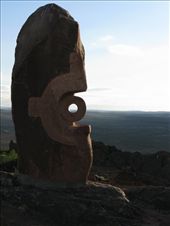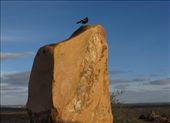A long blare of a not-too-distant horn
echoed throughout Broken Hill around 6:30pm, while we were preparing dinner.
Shortly thereafter, a short blare of the horn followed.
Being of a volume and pitch similar to what
we heard in Hawaii when the tsunami
warning system was tested each month, we wondered what these horns meant. We
were pretty sure that a tsunami wasn’t an immediate risk in Broken Hill.
 Broken Hill, otherwise known as the
“accessible outback”, is a destination, but not. Some of the key draws of
Broken Hill aren’t the city itself; rather the surrounding areas. Between the
beautiful outback surrounding Broken Hill, sculptures in the Living Desert, the national park to the north full
of aboriginal sites, the quirky ghost town of Silverton (home to many movie
sets including Mad Max), the mining town of White Cliffs where people live
underground to escape the summer heat, and the expansive cattle stations, Broken
Hill’s appeal largely lies in the area 100kms around the city.
Broken Hill, otherwise known as the
“accessible outback”, is a destination, but not. Some of the key draws of
Broken Hill aren’t the city itself; rather the surrounding areas. Between the
beautiful outback surrounding Broken Hill, sculptures in the Living Desert, the national park to the north full
of aboriginal sites, the quirky ghost town of Silverton (home to many movie
sets including Mad Max), the mining town of White Cliffs where people live
underground to escape the summer heat, and the expansive cattle stations, Broken
Hill’s appeal largely lies in the area 100kms around the city.
The town of Broken Hill itself is a heavy mining community
with over 100 years of history. With lodes of iron, zinc, silver, and other
metals, the landscape of Broken Hill somewhat resembles an open pore on the
face of the Australian outback landscape that has been squeezed for its underground
riches. This is not a particularly savoury analogy I know, but then again
mining – as necessary as it is – isn’t a particularly savoury industry.
That is not to say that the city of Broken Hill should be
avoided, by any means. There are numerous wonderful art galleries to enjoy –
almost too many proportionate to the town’s size, but you won’t hear me
complaining.
One such art gallery, and one not to be
missed, is the Silver
City Mint and Art Centre, where you can not only purchase beautiful
hand-crafted jewellery and art made by a variety of local talent, but you can
also view the Big Picture. Which is just as it sounds - a beautiful big
picture; in fact it is the world largest canvas painting at 100metres in
length.
 Broken Hill is also home to some of the
most friendly people, and conversations with passing strangers sometimes last
10 minutes, or even through tea. In our time at Broken Hill we have been
invited into people’s homes and hearts, cattle stations, and places of business
with warm welcomes and generosity that appears to be characteristic of the
Australian Outback and even of Australia
itself.
Broken Hill is also home to some of the
most friendly people, and conversations with passing strangers sometimes last
10 minutes, or even through tea. In our time at Broken Hill we have been
invited into people’s homes and hearts, cattle stations, and places of business
with warm welcomes and generosity that appears to be characteristic of the
Australian Outback and even of Australia
itself.
But back to the ominous blares that
startled us at 6:30pm while preparing dinner. Being a mining town, and one born
due to mining discoveries so long ago, men over the last century have ventured
into the mines each day to earn a hard honest living. Many men lost their lives
in various accidents, especially before we had the technology we do today to
detect and prevent problems.
Many a day, wives and children at home
would sit on pins and needles, wondering if their husbands and fathers would
make it home at the end of the day. And so was developed the shift change
alerts. I don’t know what exactly they are called, or how long the tradition
has been in place, but the alerts are still used today for the families of the
miners. The first long tone indicates the shift change, and more traditionally
lets the wives know that their husbands will be home soon and that they can
start dinner. The second shorter tone is to let the community know that
everybody is out of the mine safely.
We were lucky not to hear any variations on
these tones while in Broken Hill; no catastrophes happened, and everybody
always made it home safe and sound. (Or at least out of the mine safe and sound
– whether or not they made it home from the pub or social club is another
matter)!
We would like to extend a big thank you to
the kind folks of Broken Hill, who made our stay in the accessible outback so
special. We’ve been told that once you visit Broken Hill, you always go back.
When we do go back (a trip that is not planned, but who are we to nay-say such
a proverb), we know we’ll have many friends to share good times and warm meals
with.